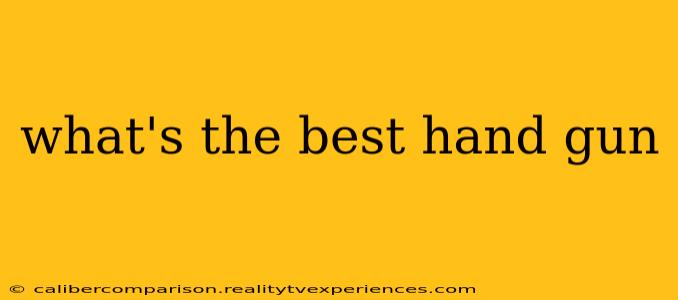What's the Best Handgun? It Depends on Your Needs.
There's no single "best" handgun. The ideal firearm depends heavily on individual needs, preferences, and intended use. Choosing the right handgun involves considering several crucial factors, and this guide will help you navigate the process. Forget the hype; let's focus on practical considerations.
Factors to Consider When Choosing a Handgun
Before diving into specific models, let's examine the key factors that influence the best choice for you:
1. Intended Use:
- Self-Defense: This is the most common reason for handgun ownership. For self-defense, reliability, ease of use, and stopping power are paramount. Smaller, more concealable handguns are often preferred for everyday carry.
- Competition: Target shooting, practical shooting, and other competitive disciplines have different requirements. Accuracy, ergonomics, and features like adjustable sights are crucial.
- Hunting: While less common, some handgun enthusiasts use them for hunting small game. Caliber and stopping power are key considerations here.
- Home Defense: A home-defense handgun should balance stopping power with ease of handling in a stressful situation.
2. Caliber:
The caliber refers to the diameter of the bullet. Popular handgun calibers include:
- 9mm: A versatile and widely available round known for its balance of stopping power and manageable recoil. Excellent for self-defense and competition.
- .45 ACP: A larger, heavier round with significant stopping power but more recoil. Suitable for self-defense but may be less desirable for smaller individuals.
- .40 S&W: A compromise between 9mm and .45 ACP, offering decent stopping power with manageable recoil.
- .380 ACP: A smaller caliber often preferred for concealed carry due to its reduced size and recoil. Stopping power is less than larger calibers.
- .22 LR: A small-caliber round suitable for target practice and plinking but generally considered insufficient for self-defense.
3. Size and Weight:
- Full-size: Offer better accuracy, ergonomics, and capacity. Less ideal for concealed carry.
- Compact: Smaller and lighter for easier concealment but may compromise on accuracy and capacity.
- Subcompact: The smallest and lightest, ideal for deep concealment but often the least comfortable to shoot.
4. Action Type:
- Semi-automatic: Uses the energy of the fired round to cycle the next cartridge. Most common type of handgun.
- Revolver: Uses a revolving cylinder to hold cartridges. Known for reliability and simplicity.
5. Ergonomics and Features:
- Grip: A comfortable and secure grip is essential for accuracy and control.
- Sights: High-quality sights are crucial for accurate shooting.
- Safety features: Many handguns include manual or grip safeties.
- Capacity: The number of rounds the magazine holds.
Popular Handgun Choices (Examples, Not Recommendations)
Instead of declaring a "best" handgun, let's highlight some popular options within various categories. Remember, this is not an exhaustive list, and thorough research is crucial before purchasing any firearm.
- For Self-Defense (Concealed Carry): Glock 19, Sig Sauer P365, Springfield XD-S.
- For Home Defense: Glock 17, Smith & Wesson M&P 9, Remington 870 (Shotgun – while not a handgun, often a preferred home defense option).
- For Competition: SIG Sauer P226, 1911 variants, various custom builds.
Conclusion: Do Your Research and Seek Professional Guidance
Choosing the right handgun is a significant decision. The information provided here is for educational purposes only and does not constitute a recommendation. Always research extensively, handle various models, and consider professional guidance from experienced shooters and firearms instructors before making your purchase. Remember to prioritize safety and follow all applicable laws and regulations.

